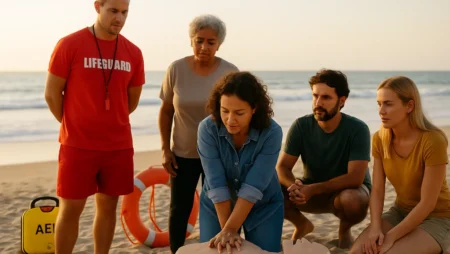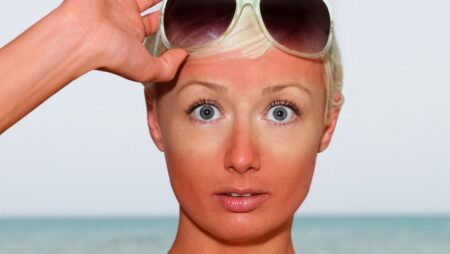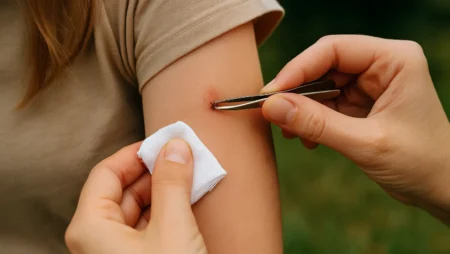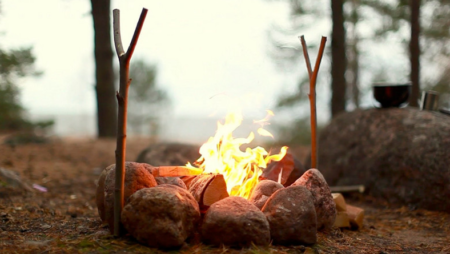
Snakes are an important part of the ecosystem, but an encounter with them can be dangerous. A snake bite is a serious incident that requires a swift response, calmness, and the right actions. Even if venomous species are uncommon, knowing what to do after a snake bite can help you avoid complications and save a life.
Bites most often happen in spring and summer, when snakes are active after winter. At this time they seek warmth and may appear near paths, in grass, among rocks or close to water. A person may accidentally step on, touch, or disturb a snake while walking in the forest, picking mushrooms, hiking in the mountains, or relaxing outdoors. Remember: reptiles don’t strike first — a bite is always a reaction of fear or self-defence.
To avoid a bite, follow some simple safety rules. Wear closed footwear and long trousers, stay alert in places where a snake may be hiding, don’t lift stones or logs unnecessarily, and don’t try to catch or scare a reptile. It’s better to go around it and give it a chance to leave on its own.
If a bite does happen, the main thing is to stay calm. Panic and unnecessary movement speed up blood flow, which can help the venom spread faster through the body. Sit or lie down, limit movement of the affected limb and keep it at the level of or below the heart. This helps slow circulation and buys more time until medics arrive.
What does a snake bite look like? You’ll usually see two small puncture marks on the skin, which may be accompanied by swelling, redness, pain or burning. In some cases, general symptoms appear within minutes: weakness, dizziness, nausea, rapid heartbeat, difficulty breathing. The intensity depends on the species, bite depth, amount of venom, and individual factors.
When should you call an ambulance? Immediately! Even if you’re not sure the snake was venomous, contacting medical professionals is essential. Doctors will assess your condition, provide professional care and, if necessary, administer anti-snake venom serum — the only effective way to neutralise toxins. Time is crucial. The earlier the treatment begins, the less damage the venom will do.
What not to do after a bite:
- ❌ Don’t cut the wound or try to suck out the venom — it’s dangerous and ineffective;
- ❌ Don’t apply ice — cold constricts blood vessels and may increase toxin spread;
- ❌ Don’t apply a tourniquet — this can cause tissue necrosis and disrupt blood supply;
- ❌ Don’t drink alcohol — it speeds up circulation and the spread of venom.
Instead, focus on proper first aid: remove jewellery from the bitten area (due to possible swelling), clean the skin around the wound with an antiseptic, keep calm and drink plenty of fluids. Avoid unnecessary movement and keep your breathing steady. If someone is nearby — ask for help; don’t try to walk long distances on your own.
A snake bite is not a sentence. With the right response, timely medical care and adherence to basic first aid rules, most cases end in full recovery without complications. The key is to keep a cool head, don’t panic and know how to act correctly after a bite.
In this article you’ll learn how to recognise a snake bite, which early signs of envenomation to look for, how to give on-site help and what to do afterwards to avoid serious consequences. We’ll also cover common myths and mistakes to avoid, and share expert tips for staying safe in nature.
How to recognise a snake bite: symptoms, signs of envenomation and your body’s first reactions

It’s important to recognise a snake bite in the first few minutes, because the speed of your response affects how effective help will be. Not all bites cause immediate pain, so paying attention and knowing the typical signs of a bite will help you act correctly.
🔍 What the bite site looks like
- Two characteristic puncture marks on the skin, about 5–10 mm apart;
- Redness, swelling or a bluish tint around the bite that may increase over several hours;
- Pain or burning that worsens when touched or moved;
- The area may feel warm to the touch, and sometimes spots or small blisters appear.
If the bite is from a venomous snake, symptoms develop faster and are more intense. With non-venomous species, there may be only mild irritation or a scratch.
⚠️ Early symptoms of envenomation
Snake venom enters the bloodstream and affects the nervous, cardiovascular and respiratory systems. It’s important to monitor the victim’s condition and recognise dangerous signs in time:
- Severe swelling and pain at the bite site that spreads up the limb;
- Weakness, dizziness, nausea or vomiting;
- Increased heart rate (tachycardia), sweating, pale skin;
- Vision problems or loss of coordination;
- Shortness of breath, laboured breathing or confusion;
- In severe cases — seizures or loss of consciousness.
These symptoms indicate that venom has entered the bloodstream and require immediate medical attention. Don’t wait for things to get worse — call an ambulance as soon as a bite occurs, even if the signs seem minor.
📈 How quickly symptoms appear
Your body’s reaction can appear within 5–15 minutes after the bite, and in some cases within an hour. If pain, swelling or a change in skin colour appear within minutes, that’s a clear sign the venom has started to act. It’s important to stay calm, note the time of the bite and tell the doctors — this helps determine the right treatment strategy.
💡 Handy tip
If possible, remember or photograph the snake that bit you. Don’t try to catch it, but describing the species will help medics identify the type of venom and choose the right antivenom faster. However, never risk your safety — this is just additional information, not a requirement.
Remember: even if symptoms seem mild, they can intensify over 1–2 hours. That’s why a medical examination and observation is always necessary after a bite. Next, we’ll look at what to do immediately after a bite — a step-by-step first-aid guide.
First aid for a snake bite: step-by-step actions before medics arrive
The first minutes after a snake bite are critical, when every action matters. Panic, haste, or the wrong moves can make things worse. So the main thing is to stay calm and act confidently. Your goal is to slow the spread of venom and stabilise the victim’s condition until professionals arrive.
First of all, stop and limit movement. If the bite occurred during a walk, sit or lie in the shade to avoid overheating. Don’t make sudden movements — any exertion speeds up blood flow and spreads the toxin.
🧭 Step-by-step first aid
To help yourself or someone else, follow these steps:
- 1. Immobilise the limb. Keep the arm or leg below heart level. You can lightly secure it with cloth or a bandage to prevent involuntary movement.
- 2. Remove jewellery, watches, tight clothing. Swelling can increase quickly and constriction worsens circulation.
- 3. Clean the skin around the bite. Use clean water or an antiseptic (chlorhexidine, miramistin). Don’t squeeze or press to expel venom, and don’t rub the wound.
- 4. Ensure rest and hydration. Water helps maintain fluid balance and reduces intoxication. Alcohol and coffee are strictly prohibited.
- 5. Call an ambulance. Report a snake bite, give the time, place and main symptoms. If you saw the snake, briefly describe its appearance, but don’t try to catch it.
All these steps help you buy time and minimise the effects of envenomation. If there are others nearby, ask for help — moving around on your own is undesirable.
💬 Psychological support
Panic is one of the main enemies in such situations. Steady breathing, even inhales, and talking to the victim help reduce stress. If someone else is present, they should reassure the person, explain that help has been called and everything is under control. Remember: most snake bites are not fatal if help is provided in time.
💡 Useful tips
- Note the time of the bite — this is important for doctors when administering antivenom;
- Don’t apply cold or ice — this constricts vessels and can worsen the toxin’s effect;
- Monitor symptoms — if dizziness, weakness or shortness of breath appear, tell medics;
- Avoid physical effort, talking and movement — rest reduces the effect of venom.
Remember: the aim of first aid is to stop the spread of venom, keep the body stable and hand the victim over to doctors in the most controlled state possible. Don’t rely on myths or folk remedies — only a cool head and clear actions will help.
In the next section we’ll look at what to do after the bite: how to disinfect the site properly, what to watch for in the first hours, and how to prevent complications.
What to do after a snake bite: disinfection, monitoring and preventing complications
After giving first aid and stabilising the condition, the most important thing is to monitor symptoms and prevent complications. A snake bite isn’t just a momentary reaction — the process can evolve over several hours. That’s why it’s important to know how to care for the bite site, what to watch for, and when to see a doctor even if symptoms are mild.
🧴 Disinfection and caring for the bite site
After a bite, the skin around the wound needs careful disinfection. Use an antiseptic (miramistin, chlorhexidine, hydrogen peroxide), but don’t rub or massage the affected area. The main goal is to prevent infection without stimulating blood flow, which can spread toxins.
- Don’t apply tight bandages — light dressing is enough to protect from dirt;
- Don’t use ointments or creams until a doctor assesses the wound;
- Keep the skin clean and exposed to allow natural healing.
🩺 Medical observation after a bite
Even if symptoms seem mild, seeing a doctor is essential. In some cases, the venom’s effects appear with a delay, so medical observation helps detect complications in time. At hospital they may do a blood test, examine the wound and, if needed, administer anti-snake venom serum.
Symptoms requiring urgent medical attention:
- Severe pain or rapid increase in swelling;
- Breathing difficulties, dizziness, loss of consciousness;
- Nausea, weakness, irregular heartbeat;
- The appearance of red patches or skin discolouration around the bite.
All these signs may indicate the systemic action of venom or an allergic reaction. The earlier a doctor evaluates your condition, the lower the risk of serious consequences.
💧 Recovery and supporting the body
After a bite, it’s important to help your body recover from within. Follow these simple but effective tips:
- Drink plenty of water or unsweetened drinks to maintain fluid and electrolyte balance;
- Avoid alcohol, coffee and energy drinks — they speed up toxin circulation;
- Rest and avoid physical exertion for several days;
- Eat light, vitamin-rich foods — fruit, vegetables, cereals, lean meat.
🧠 Psychological aspect and self-monitoring
A snake bite is a serious psychological stressor. Don’t ignore your emotional state — feelings of fear, anxiety or panic can affect recovery. If possible, talk to a professional or close ones to ease the emotional load.
During the first 24–48 hours, watch your wellbeing carefully. If new symptoms appear, seek medical help immediately. In some cases, a doctor may schedule a follow-up check in 2–3 days to ensure your condition is stable.
Remember: even if the bite seems mild, underestimating the situation can lead to serious consequences. After any contact with a snake, the rule applies: “better to play it safe than underestimate the danger”.
Photo & video gallery: venomous snakes
Below is a selection of notable venomous snake species from different regions of the world — Europe, North America, Asia, Africa and Australia. Each photo opens in a lightbox with a caption (scientific name + region) to help you identify the species, understand its range and better assess risks while travelling and enjoying the outdoors.

























No Comment
You can post first response comment.